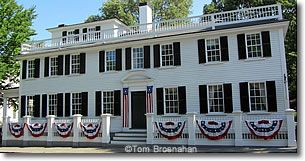Manchester-by-the-Sea Guide
Settled in 1629, Manchester-by-the-Sea is a charming New England town on the North Shore of Massachusetts Bay, with a fine beach.
Manchester-by-the-Sea, 30 miles (48 km) northeast of Boston on Cape Ann (map), is a small, neat coastal suburban community reachable by MBTA Commuter Rail trains.
Its long name serves to distinguish it from the far larger, land-locked city of Manchester, New Hampshire. The two places couldn't be more different.
Singing Beach
The town's major attraction in summer is Singing Beach, an appealing expanse of sand a half-mile (800 meters, a 10- to 15-minute walk) southeast of the town center along Beach Street.
Singing Beach in Manchester-by-the-Sea, Massachusetts, 30 miles (48 km) northeast of Boston on Cape Ann, is a pretty beach, and usually uncrowded.
Local residents, who control access to the beach, intend to keep it that way.
The beach is composed of "singing sand" that makes a noise when you walk on it, or when it blows in the wind.
Facilities include a snacks-and-drinks stand, toilets and showers. There is very little shade, so bring your own beach umbrella.
Transportation
Cost and time are considerations for a day at the beach in Manchester-by-the-Sea. Besides tickets for the 50-minute MBTA Commuter Rail train ride on the Rockport line from Boston's North Station, you will have to make the half-mile (800-meter), 10- to 15-minute walk along Beach Street from the train station in the town center to the beach, and then pay $5 per person admission fee to the beach.
If you drive, the parking lot next to the beach is open only to town residents on weekends (Friday through Sunday).
Monday through Thursday non-residents may park in the lot for a charge of $25 per car. There is no other legal parking near the beach, only in the town center.
On weekends, all-day parking in the town center costs $25, and you must still walk to the beach and pay the $5 per-person admission fee.
A Bit of History
Though settled in 1629 as the fishing village of Jeffery's Creek, and incorporated in 1645, Manchester was just a village until the mid-1800s, when Bostonians of means began to build huge Shingle-style summer "cottages" here.
Manchester continues to be largely a community of means, with many fine houses and estates. The Manchester Historical Museum, in the Trask House (1834) at the town center opposite the Public Library and First Parish Church, is a good symbol of this.
Where to Stay
Manchester-by-the-Sea has few lodging places, so it's better to make your North Shore or Cape Ann base in Gloucester or Rockport.

